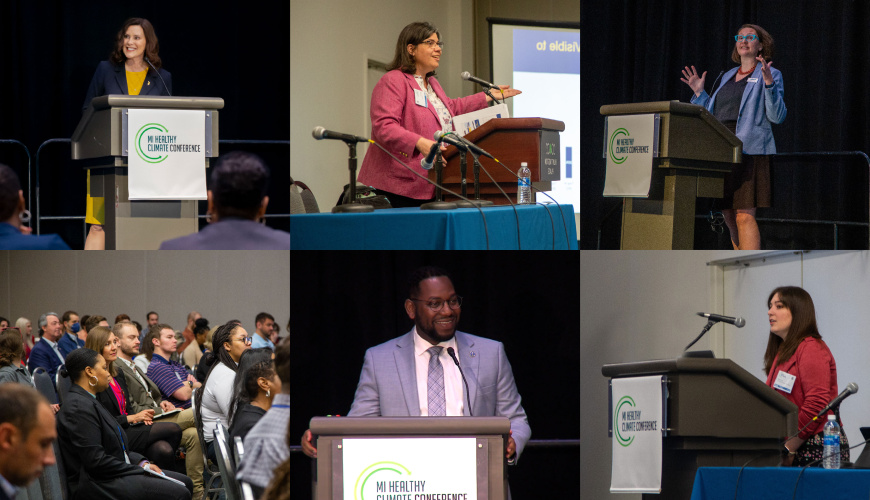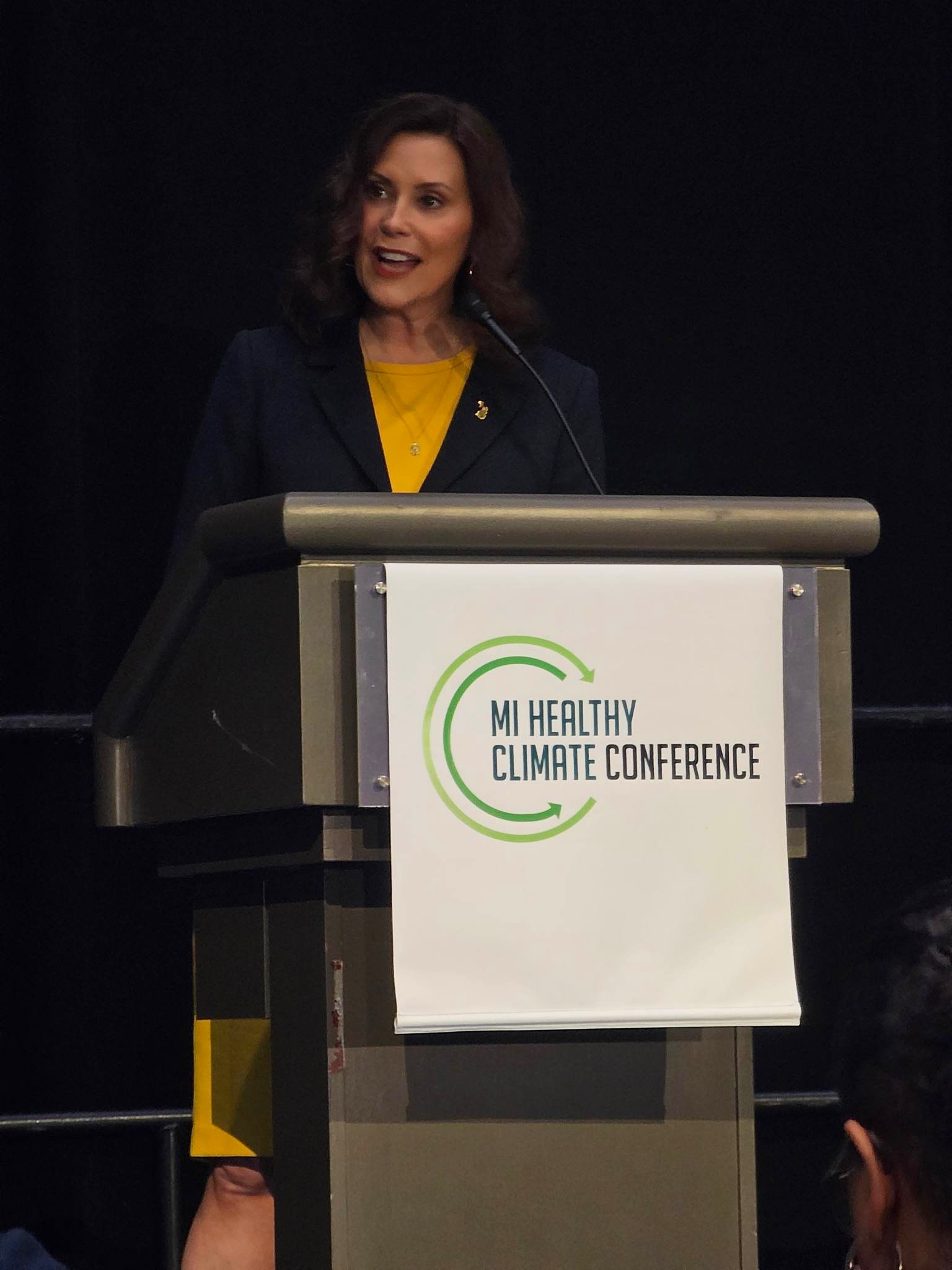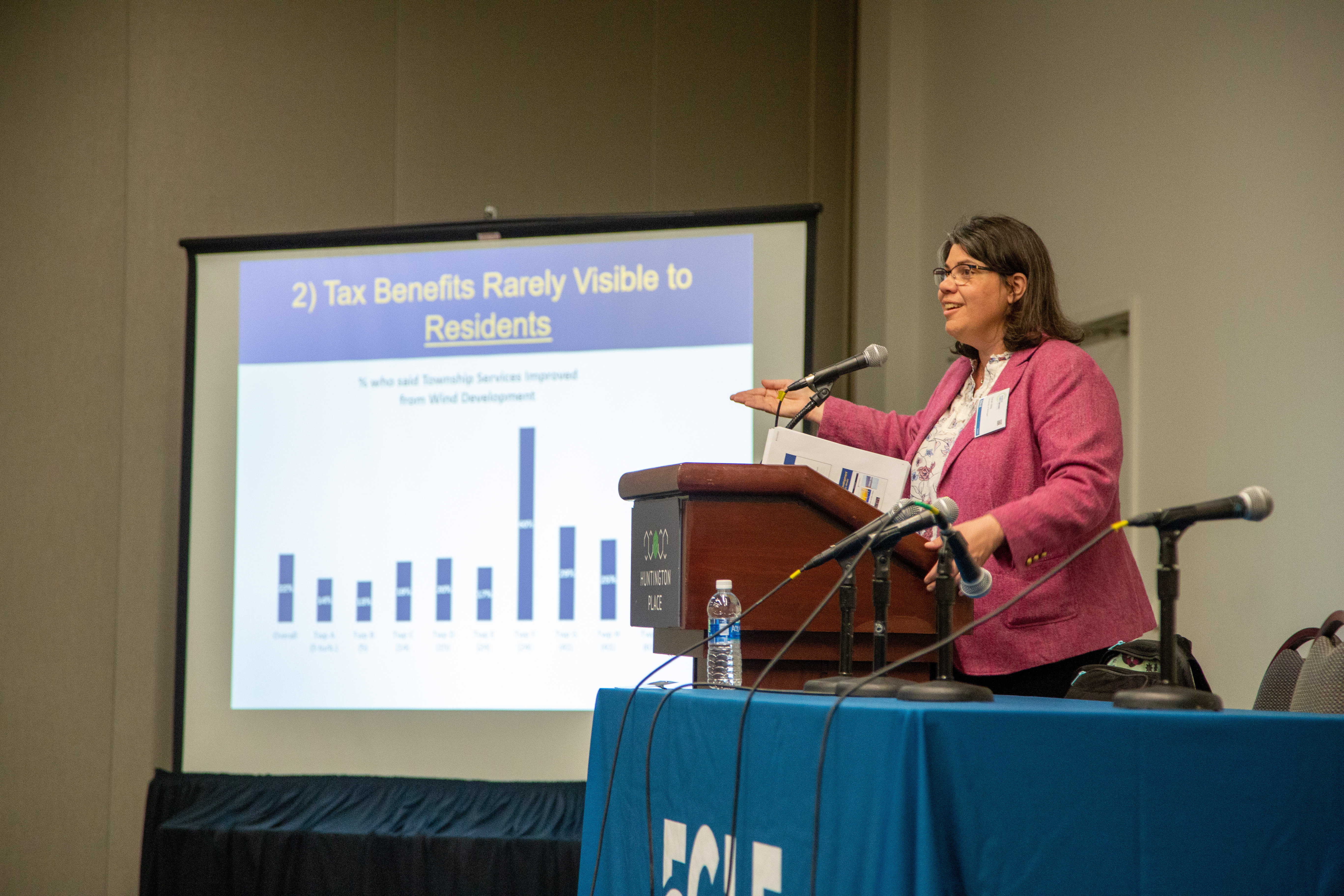
 back to all news
back to all news
SEAS collaborates to advance climate solutions at MI Healthy Climate Conference

Faculty, staff and alumni from the University of Michigan, including members from the School for Environment and Sustainability (SEAS) and community partners had a strong showing at the two-day, sold-out MI Healthy Climate Conference in Detroit April 11-12. The inaugural conference, hosted by the Michigan Department of Environment, Great Lakes, and Energy (EGLE), drew 600 leaders and stakeholders from across the state to mobilize on climate action and unify efforts to implement Gov. Gretchen Whitmer’s MI Healthy Climate Plan.
The ambitious plan lists six key targets for achieving statewide carbon neutrality by 2050, including protecting Michigan’s land and water, innovating in green industry, electrifying transit and supporting frontline communities disproportionately impacted by the climate crisis. The plan also aims to derive 60 percent of the state’s energy from renewables by 2030. Michigan received funding in March to support this goal and bolster its clean energy economy.
Whitmer, who made a surprise guest appearance at the conference, said, “We recently won a $3 million federal grant to implement the MI Healthy Climate Plan, and I proposed over $1 billion of investments in my budget to lower the cost of electric vehicles, reduce industrial emissions and protect clean air and water in schools. I am a climate optimist because I know that…we will compete for every dollar possible from recently passed federal legislation so we can create good-paying, clean-energy jobs, lower emissions and build a brighter future for our kids.”
The Inflation Reduction Act, which is the largest investment in climate action in American history, has allowed for a significant increase in collaboration across organizations and sectors, making it an opportune time to reach the plan’s targets.

The conference featured plenary talks on statewide decarbonization and environmental justice, while breakout sessions on the second day allowed a deeper dive into topics like energy storage infrastructure, curtailing food waste and Indigenous approaches to ameliorating the climate emergency.
Cory Connolly, Climate and Energy Advisor with the EGLE Office of Climate and Energy, said in an opening keynote address that EGLE wanted to get everyone working on climate together in the same room. EGLE directs the state’s climate mitigation, adaptation and resilience efforts.
“This conference is an inflection point,” said Connolly.
Tony Reames, who is currently on leave from his position as an Associate Professor of Environment and Sustainability at SEAS to serve as Deputy Director for Energy Justice at the U.S. Department of Energy, spoke to a packed house and discussed the need for a community-centered, just-energy transformation.
“Low-income communities, energy-burdened, energy-transitioning communities—these are communities that bear the burden of our energy system. They experience climate change first and worst, and they stand to lose the most if we don’t fully include them in the design of our new energy system…Racial and economic disparities are the result of legacies of land theft, slavery, Jim Crow, redlining and a host of other government-sanctioned policies, and just like those policies were intentional, our efforts to undo the persistent harm of our energy system must also be intentional and government-sanctioned,” Reames said to an applauding crowd.

One program that Reames and other speakers highlighted is President Biden’s Justice40 Initiative, which invests a minimum of 40 percent of the benefits of new climate infrastructure toward access to low-cost capital and public services in disadvantaged communities. In 2021, the Justice40 Accelerator was launched to hasten deployment at the local level, providing a 12-month cohort experience to environmental and climate justice organizations with predominantly Black, Brown, and Indigenous leadership. The Accelerator offers technical assistance, support in forming partnerships, and guidance in applying for federal aid to implement community-developed solutions.
In a breakout session about the Justice40 Initiative, panelist Stacy Grant, a U-M alumna and Navigator with the Justice40 Accelerator, said, “Building capacity takes capacity.” Many overburdened communities do not have the time, resources or bandwidth to tackle climate challenges on their own, and organizations like the Accelerator strive to empower them.
Sylvia Orduño, who did her graduate work at U-M and now chairs the Michigan Advisory Council on Environmental Justice, spoke on the panel alongside Grant. Orduño suggested that joint efforts between government and philanthropic, private and educational sectors provide a mechanism for community voices to be heard at a higher volume. She called out the necessity of deeper embeddedness in communities by external partners.
“Government and a lot of private sector [officials] are poor listeners. They might claim to be doing community engagement but they’re not really engaging, they’re just doing a lot of drive-bys…it’s not engaging if you don’t stay.”
It is cross-sector solutions that the Detroit Sustainability Clinic, founded in 2021, also prioritizes. The Clinic seeks to fortify the city’s ability to address climate change impacts, while providing SEAS students with real-world, professional experience in supporting underserved communities. Fostering connections between residents, organizations, municipal leaders and U-M affiliates with issue-specific expertise, the Clinic takes a strong stance of “listening first,” recognizing that communities themselves are the best authority on what they need.
Kerry Duggan (MS ’06), a former Biden advisor, serves as Executive Director of the Clinic, and founder and CEO of SustainabilID, a woman-owned, strategic climate advising firm based in Detroit. At the conference, Duggan moderated a panel on corporate climate leadership with administrators from Dow, Ford Motor Company, Bedrock Detroit and Steelcase Inc. Duggan, herself a Detroit native and SEAS alumna, asked the panel to reflect on methods for accelerating climate change alliances and achieving goals within the context of the MI Healthy Climate Plan. Panelists affirmed that thoughtful partnerships have allowed them to reach decarbonization milestones much faster than they could have otherwise.
"We have a lot of specific silos of excellence in different industries up here on the panel, but busting through those silos and learning to work together [is the objective]...Collaboration is a contact sport," said Duggan.
This collaborative approach is exemplified in the SEAS Detroit Sustainability Clinic’s inaugural partnership with Jefferson East Inc. (JEI), an organization that serves low-income residents in five neighborhoods, including Jefferson-Chalmers, which has experienced repeated catastrophic flooding. A team of SEAS master’s project students began working with JEI and Duggan last year to analyze flood mitigation, protective planning and community relief options. The project is slated for completion in May, with new Clinic master’s projects that center on community-driven solutions launching this summer.
Carla Walker-Miller, CEO of Walker-Miller Energy Services—one of the largest African American and woman-owned energy waste reduction companies in the U.S.—emphasized the importance of giving impacted communities a strong voice in decision-making during her talk, “Repairing and Decarbonizing Michigan Homes and Businesses.”
“Do not speak for people you do not speak to,” Walker-Miller said.
When seeking a just-energy transition, rural communities and farmers also have a critical and sometimes overlooked role to play. Renewable energy policy decisions are typically made in urban centers, but the vast majority of wind turbines and solar arrays in Michigan are installed on rural lands—often amidst significant contention.
“All energy sources have pros and cons at the local level,” said Sarah Mills, Senior Research Specialist at the U-M Graham Sustainability Institute and Lecturer at SEAS, in her talk on the intricacies of siting renewables to meet climate goals. “Renewable energy is, I think, the biggest opportunity rural communities have seen in decades.” Mills, who is also a U-M alumna, advocated for townships to begin proactively planning whether renewables might fit in with community objectives—even before proposals from renewable energy developers arrive.

Fortunately, initiatives like the MI Healthy Climate Plan are normalizing climate as a topic for conversation among Michiganders.
By the end of day two, conference-goers were greeting new friends and scheduling future meetings. Cory Connolly’s aspiration seemed to be coming true:
“I hope that we look back at these two days and can say, ‘That’s where we launched that campaign, that’s where I met my co-founder, my business partner, my first funder. That’s where everything changed for Michigan and climate.’”

